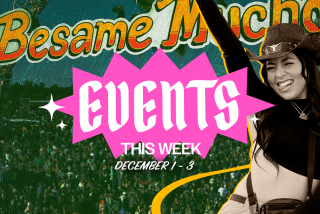Festival to Celebrate Folk Traditions
- Share via
Elaine Weissman prepares for the Summer Solstice Folk Music, Dance & Storytelling Festival in Calabasas as if she were a general about to go to war.
This year’s festival, running Friday through Sunday, has been in the works for more than 18 months. Five thousand people are expected to attend the festival, the largest traditional music and arts fest on the West Coast, and the logistics are as complicated as a cat’s cradle.
The contract to bring folk legend Jean Ritchie to the event was inked two years ago, said Weissman, who has organized 19 previous festivals. More than 100 traditional artists, some world famous, have been hired to perform and teach.
A 40-foot-by-90-foot wooden dance floor will be built over the clay tennis courts on the Soka University campus, impervious to the most leaden-footed clog dancer but easy on the knees. Vendors, security personnel, an emergency medical team, 18 portable toilets to augment those already on campus, water jugs--all must be in place when the first folk enthusiast arrives.
“It’s like a military operation,” said Weissman, 62, executive director of the California Traditional Music Society, the festival’s sponsor.
Southern California isn’t the cradle of the traditional arts that Appalachia is, but Greater Los Angeles has its own folk roots. Woody Guthrie once strummed his guitar, naked, in Topanga Canyon. Joni Mitchell sang about life as one of the ladies of Laurel Canyon, and 91-year-old Bess Lomax Hawes, a winner of the National Medal of the Arts for her advocacy of folk traditions, lives in Northridge.
There are thousands of folk fests in the United States each year, said Mark Moss, editor of Sing Out, a Bethlehem, Pa.-based folk music magazine. But the Calabasas festival is unusual, he said, because of its “allegiance to traditional or rooted music as opposed to singer/songwriter-type music.”
Its organizers say that the festival will feature music and other arts from a dozen cultures, including Quebecois, Iranian and Romany (or gypsy). Celtic music will be performed in all its variants, including Irish, Scottish and Breton.
But audience participation is the heart of the festival, Weissman said.
Visitors may choose from more than 300 workshops, among them sessions on how to play Andean panpipes and the Australian aboriginal horn known as the didgeridoo. They can learn how to do the lively Italian folk dance called the tarantella and join in daily sessions of contra dancing.
Sunland’s Frank Hoppe, 48, who has coordinated the contra dancing at past festivals, described it by saying, “Remember the old Virginia reel when you were in junior high? That’s a really primitive form of contra dance.”
“We’re keeping these traditions alive by teaching them to another generation, who’s teaching them to yet another generation,” Weissman said.
Steve Dulson, 52, of Long Beach is in charge of instruction on the mountain dulcimer. He explained how the traditional Appalachian instrument differs from the hammer dulcimer, which typically rests in front of the player, who strikes it with small hammers.
“The mountain dulcimer is a fretted instrument like a guitar,” said Dulson, who plays one in an Irish band called the Tinker’s Own. “It’s played on your lap, and it’s typically strummed or finger-picked.”
Newly inducted into the Kentucky Music Hall of Fame, 80-year-old Jean Ritchie will sing at the festival and play the mountain dulcimer she popularized.
“Everybody’s excited about seeing her,” said festival director Tammy Javorsek, 44. “They sense that she’s not coming around that many more times.”
Ritchie will also teach a workshop or two, said Dulson, who has lined up four other teachers as well.
But it wasn’t Ritchie who turned Dulson on to the mountain dulcimer. “The first time I ever saw one was on ‘The Ed Sullivan Show,’ when Brian Jones of the Rolling Stones was playing it on ‘Lady Jane.’ ”
Ron Brown, 45, of Long Beach will conduct “boot camps” on an Irish drum called a bodhran. What distinguishes a boot camp from other beginning instruction, Brown said, is that boot camps are for people who see the word bodhran and ask, “How do you pronounce that?” The answer, according to Brown: bow-rawn.
Brown started playing Celtic music 25 years ago. With fellow enthusiasts, many of whom he met at past festivals, Brown formed the Celtic Regional Arts Institute of California, or CRAIC. “In Ireland, craic means a great time, a good time, fun,” Brown said.
Jim Beloff, 46, who lives in the Hollywood Hills, is in charge of ukulele instruction.
Beloff, who has written more than a dozen books about the ukulele, said he tumbled for a beautiful little uke 10 years ago at the Rose Bowl Flea Market.
“Within a week I was so smitten I gave up the guitar, which I had been playing for 30 years,” said Beloff, who once spent an afternoon jamming with the late George Harrison on their ukuleles.
None of the artists at the festival has ever made outrageous demands of the kind rock musicians are notorious for, organizers said. “I don’t think there are divas in folk,” said festival director Javorsek.
More to Read
Sign up for The Wild
We’ll help you find the best places to hike, bike and run, as well as the perfect silent spots for meditation and yoga.
You may occasionally receive promotional content from the Los Angeles Times.






